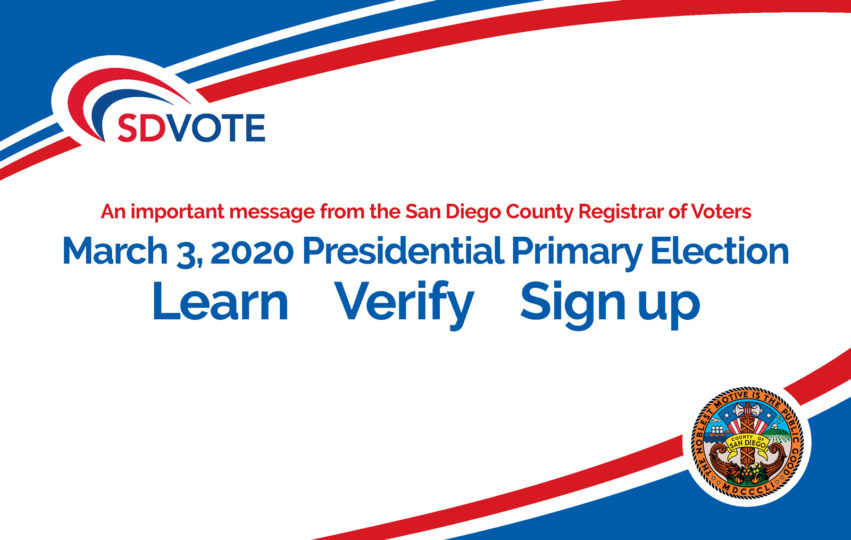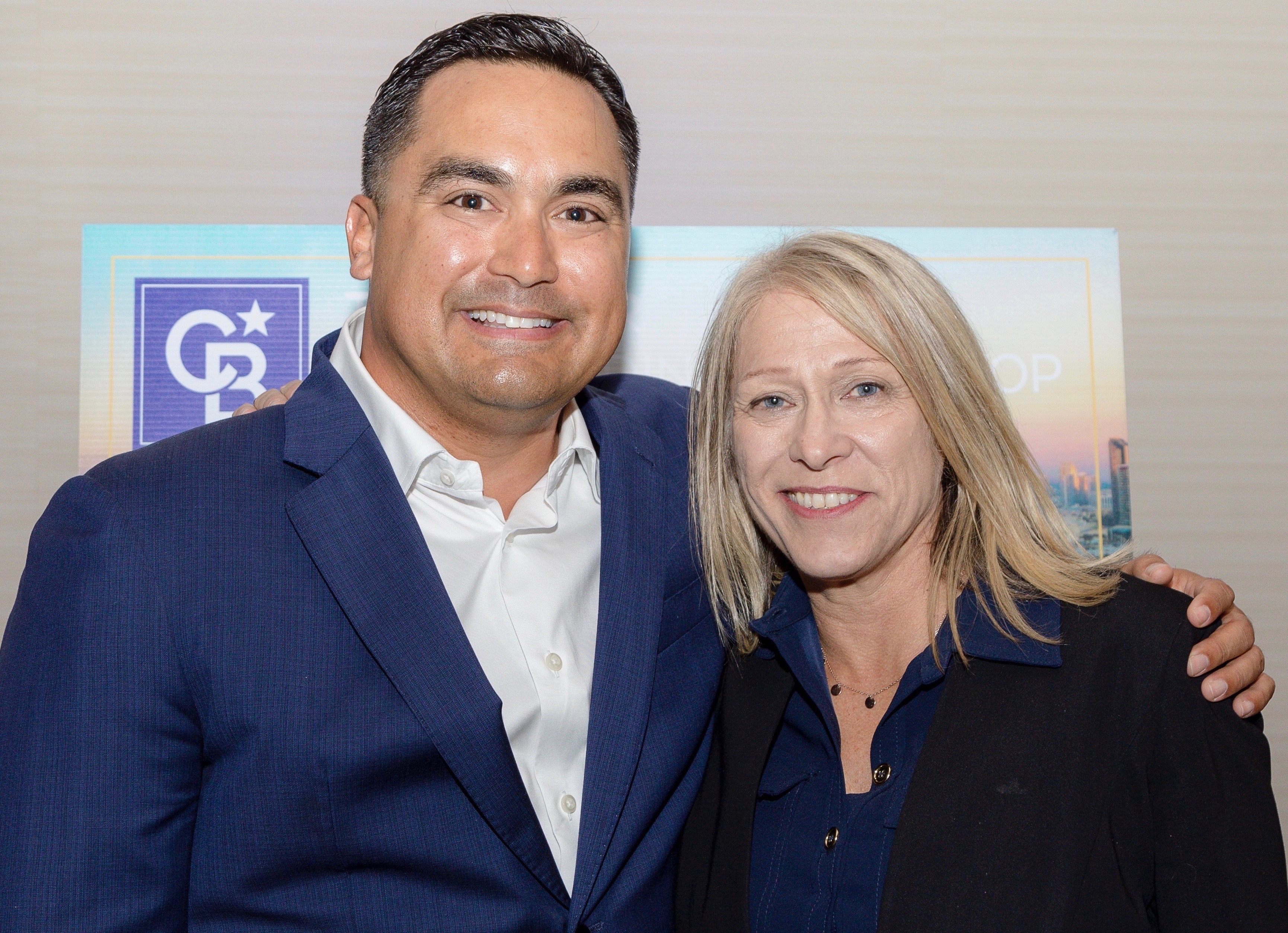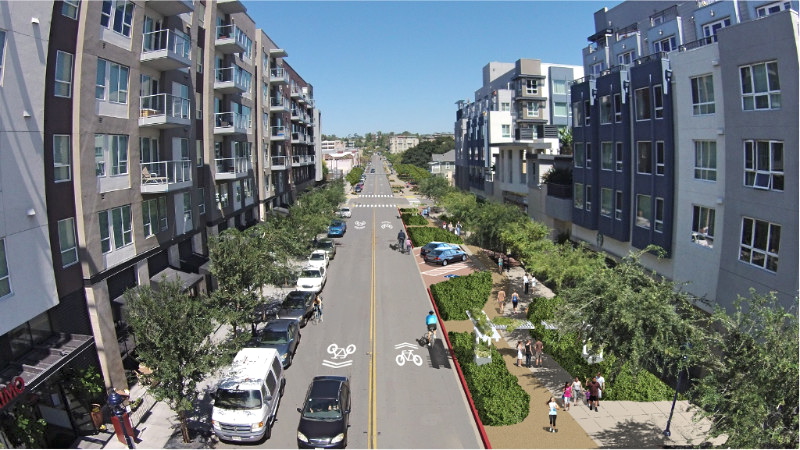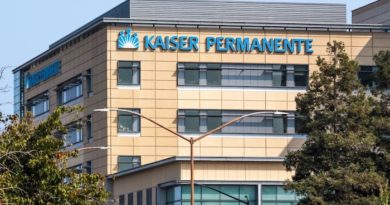Daily Business Report-Nov. 25, 2019
CBW President Peter Mendiola and Penny Nathan, president/CEO of Ascent Realty.
Merger of Coldwell Banker West, Ascent Realty
creates one of the largest San Diego brokerages
Coldwell Banker West (CBW), one of San Diego County’s largest real estate brokerages, has announced a merger with San Diego-based Ascent Real Estate. The merger was jointly announced by Peter Mendiola, CBW president, and Penny Nathan, president/CEO of Ascent, who will become a partner of CBW. Financial terms of the deal were not disclosed.
The merger is believed to be one of the largest in recent San Diego real estate industry history, according to Mendiola. The combined brokerage, to be called Coldwell Banker West, with 14 offices and nearly 1,000 sales agents, becomes one of the largest real estate companies in all of San Diego County. The newly expanded CBW is expected to represent annual property sale volume exceeding $2.5 billion. CBW officials said sales volume in 2018 reached about $1.5 billion for CBW and about $850 million for Ascent.
Ascent Real Estate, a privately held firm established by Nathan in 2005, previously operated eight offices and has nearly 150 agents. Ascent operated offices in La Jolla, Coronado, University City, Bankers Hill, Kensington, Mission Hills, North Park, Point Loma Village and Liberty Station. With the merger, CBW plans to continue to operate and enhance support at these locations. CBW, founded in 2007, operates six offices with more than 800 agents. CBW offices are located in Downtown San Diego, Chula Vista, Bonita, Eastlake, La Mesa and El Cajon.
“Peter has been pursuing a merger with Ascent for a number of years,” said Nathan. “I believe the stars have aligned for Ascent to go above-and-beyond for their clients by adding the powerful Coldwell Banker brand and iconic North Star logo. The time is right for our company and our agents to take the next step in their careers because our industry is undergoing dynamic changes. In the future, larger and stronger brokerages will be in a better position to serve top-selling, productive agents and their clients.
______________________
Incorporate La Jolla launches
new study to form its own city
By Dave Schwab | sdnews.com
La Jolla has launched a new feasibility study to kick-start an incorporation drive seeking to detach from San Diego and become its own city.
There have been several unsuccessful attempts over the years to incorporate La Jolla. However, a movement continues to be spearheaded by a devoted contingent of residents who are convinced the jewel would be better off as its own municipality.
“We’ve changed our name back to Incorporate La Jolla,” said long-time cityhood proponent Melinda Merryweather. She added an anonymous, third-generation donor has agreed to fund a $40,000-plus feasibility study required as a first step in the long, involved incorporation process.
In a previous cityhood attempt, La Jolla commissioned a feasibility study by outside consultants, which determined La Jolla could afford to secede from San Diego and become its own incorporated entity providing its own public services.
“That study said more money comes out of La Jolla than goes back into it,” said Merryweather. “It said, without a doubt, you can go do it.”
There are 18 incorporated cities in the county of San Diego. The last community to successfully incorporate was Encinitas in 1986.
______________________
City revises loan program to offer small
businesses increased access to capital
The city of San Diego has revamped its Business Finance Loan Program to offer more business-friendly features, remove funding barriers and meet the changing needs of entrepreneurs.
The updated loan program, which is administered by the city’s Economic Development Department, lends local businesses funding from $10,000 to $500,000. Interest rates range from 4 percent to 10 percent, and funding match requirements are now lower and more flexible, especially for very small businesses and startups. The previous program didn’t offer funds less than $25,000, its interest rate floor was 8 percent and its 2:1 matching requirement created a high barrier for young businesses not yet bankable to traditional lenders.
Originally launched in the early 1990s, the City of San Diego Business Finance Program historically offered businesses a variety of funding mechanisms. In recent years, the program consisted of Small Business Micro Revolving Loans ($25,000-$150,000) and San Diego Regional Revolving Loans ($150,000-$500,000). The City has given 79 loans totaling $8.9 million to support businesses, including $250,000 to AleSmith Brewery Company of Mira Mesa and $150,000 to Nomad Donuts of North Park.
Click here for more information or to apply for the Business Finance Loan Program. Or contact the Economic Development Department at 619-236-6700 and sdbusiness@sandiego.gov.
______________________
County supervisors approve traffic study
to reduce air pollution in Portside neighborhoods
County Supervisors unanimously approved a plan to reduce air pollution and improve health in the region’s Portside neighborhoods — Barrio Logan, Logan Heights, Sherman Heights and western National City — by studying the types of trucks and cars driving through them.
The study would create a local “inventory” of air pollution and the types of vehicles expected to be emitting it. The inventory would then allow the County to more accurately target $18 million in incentives to encourage people to change from high-polluting vehicles and equipment to less-polluting types, thus reducing pollution and improving health.
The study will use automated license plate reader software to allow the county’s Air Pollution Control District to analyze information about the types, makes, models, age and fuel type of cars and trucks driving in the Portside neighborhoods. The license readers will not include any personal information such as owners’ names and addresses. No information will be shared with any other agencies, including law enforcement. All information collected will be deleted within three days of completing the analysis.
______________________

City of San Diego may release water
from Hodges Reservoir in coming months
The city of San Diego may release water from Hodges Reservoir into San Dieguito River in the coming months if rain events raise the water level above the permitted level.
For safety reasons, the California Division of Safety of Dams has determined that the water level at Hodges Reservoir should not be above 295 feet, which is 20 feet below spillway elevation, or the top of the dam. If the water level exceeds that measurement or nears that measurement when rain is forecast, city officials will likely open valves at the dam for a controlled release of some of the water. The released water will enter San Dieguito River and eventually the Pacific Ocean.
City officials will monitor weather forecasts, rainfall and the water level at Hodges Reservoir to determine when releases would be necessary.
Hodges Reservoir was created with the building of Hodges Dam on San Dieguito Creek in 1918. The reservoir currently serves the San Dieguito Water District and Santa Fe Irrigation District as well as the city of San Diego.
______________________

Registered voters getting postcards explaining
rules on voting in March presidential primary
Postcards are showing up in the mailboxes of 1.8 million registered San Diego County voters, alerting them to political party rules on voting for president in the March 3, 2020 primary election.
Political parties decide who can vote for their presidential candidates.
Anyone who is registered as nonpartisan – also known as independent, no party preference or decline to state – will not see the presidential race on their primary election ballot at all. To vote for president on March 3, 2020, they must act to get that option.
The American Independent, Democratic or Libertarian parties are allowing nonpartisan voters to cross over and vote for their presidential candidate. But they must request one of those ballots.
To vote for a presidential candidate with the Green, Peace and Freedom or Republican party, nonpartisan voters must re-register with that party.
Voters who are already registered with a political party will get only that party’s ballot with their presidential candidate. To vote for a candidate in another party, the voter will need to re-register with that party.
Voters can double check their registration, re-register and register to vote at sdvote.com. Voters who have moved, changed their name or visited the DMV recently will also need to re-register. For more information, call (858) 565-5800 or visit sdvote.com. You can find additional resources about the upcoming election here.
______________________
San Diego ranked No. 1 among U.S.
cities for tech-driven innovation
The Center for Digital Government ranked San Diego first among America’s largest cities for its use of innovative technology to streamline local government. Climbing up from second, the City of San Diego was praised for its use of technology in responding to homeless challenges as well as improving quality of life.
______________________
Chula Vista ranked No. 2
best city for immigrants
As part of its annual Cities Index report, The New American Economy (NAE), a bipartisan research and advocacy organization, evaluated immigrant integration by measuring local policies and socioeconomic outcomes across the 100 largest cities in the U.S. The city of Chula Vista was ranked No. 2 behind Chicago.
______________________
H.G. Fenton Company receives
record 34 Mark of Excellence Awards
The Southern California Rental Housing Association awarded H.G. Fenton Company 34 Mark of Excellence Awards in 2019, marking a new record for the development company. The Mark of Excellence Awards honor outstanding achievement in the San Diego County rental housing industry.
______________________
Commentary
California legislators must stop the attorney
general from rigging ballot initiative descriptions
By Kevin Kiley, Special to CalMatters
Imagine that in next year’s presidential race, election officials scrambled the letters in Donald Trump so it appeared on ballots as Daldon Prumt. Most people would agree this is not acceptable. Voters need their ballots to accurately convey who it is they are voting for or against.
Yet for decades, a similar exercise in obfuscation has been perpetrated on California voters.

Every two years, Californians become lawmakers by voting on statewide ballot propositions, which often have enormous consequences for the state. To understand what it is they are voting for or against, many voters rely solely on the description of the proposition written on their ballot. But time and again, this “description” has failed to accurately convey what the proposition would do.
Oddly, the job of writing these all-important ballot descriptions falls not to an elections officer or some other neutral official, but is instead entrusted to the partisan, elected attorney general of California.
Our current Attorney General, Democrat Xavier Becerra, is only the latest in a line of attorneys general who have exercised this power without even a pretense of impartiality, instead skewing ballot language to lead voters towards their preferred political outcome.
Last month, Becerra’s office released the ballot description for a proposed $12.5 billion a year in new taxes on business properties.
The most salient fact about this proposition—that it is a massive tax increase—is mysteriously absent from Becerra’s description.
Instead, the attorney general mentions three times in the 100-word summary that the measure would fund education and schools. Not coincidentally, this major assist from the attorney general came after polls showed the proposal, when accurately described, failing to gain traction with voters.
For many observers, Becerra’s latest attempt to subvert the electoral process is a bridge too far. Editorial boards and columnists across the state expressed frustration and outrage, calling his ballot description an “abuse of power,” “shameful,” “dishonorable,” “taking political sides.”
A San Francisco Chronicle columnist observed that Becerra “can’t be trusted with that solemn obligation to voter education.”
This misuse of power is not unique to Becerra or his political party. In 1996, Republican Attorney General Dan Lungren wrote a misleading summary for Proposition 209, an initiative seeking to end affirmative action in California.
More recently, in 2015 Democratic Attorney General Kamala Harris wrote a slanted title and summary for a pension reform measure, which the backers ultimately abandoned because Harris took the fate of the measure into her own hands.
And two years ago, Becerra took heat for not including the words “tax” or “fees” in his description of the 12-cent-a-gallon gas tax repeal, which ultimately confused voters and led to the measure’s defeat.
The attorney general, or any elected politician, is simply the wrong person to be tasked with writing neutral ballot language. After all, ballot propositions are supposed to be a way for citizens to make laws directly without politicians standing in the way.
That’s why I proposed Assembly Constitutional Amendment 7, which would take the authority away from the AG and put it in the hands of a nonpartisan entity free from political pressures by special interests.
Specifically, ACA 7 would assign ballot descriptions to the Legislative Analyst’s Office, which has proven itself trustworthy and capable of writing impartial analyses of every initiative that qualifies for the ballot.
This change would ensure fairness in our initiative process regardless of who is elected attorney general–something all voters deserve. That’s why good government groups such as California Common Cause and the League of Women Voters of California have endorsed my proposal.
When the Legislature reconvenes in January, I am calling on my colleagues to restore fairness to the initiative process and pass ACA 7.___
Republican Assemblyman Kevin Kiley represents the 6th Assembly District, which includes parts of El Dorado, Placer, and Sacramento counties, Assemblymember.Kiley@assembly.ca.gov. He wrote this commentary for CalMatters, a public interest journalism venture committed to explaining how California’s Capitol works and why it matters.



